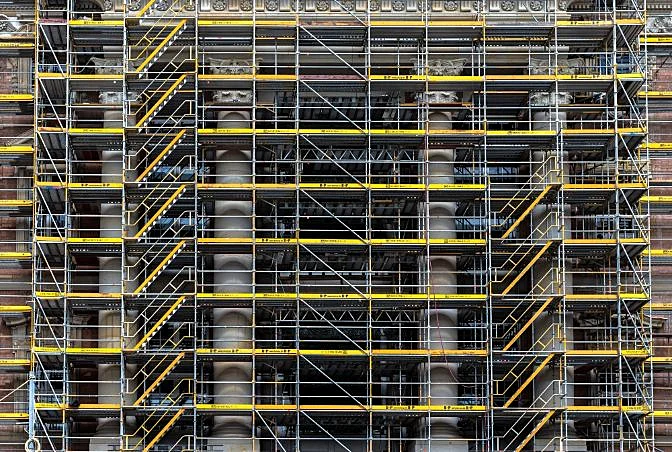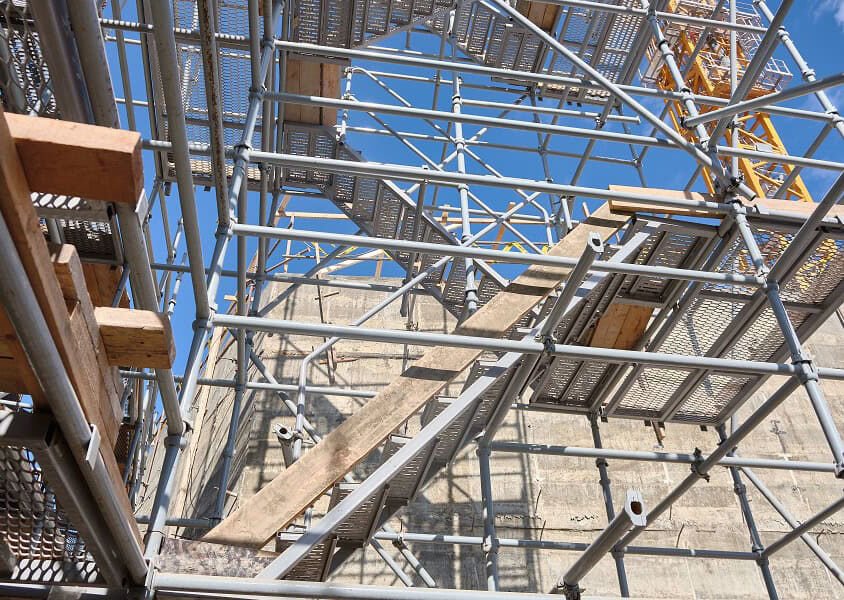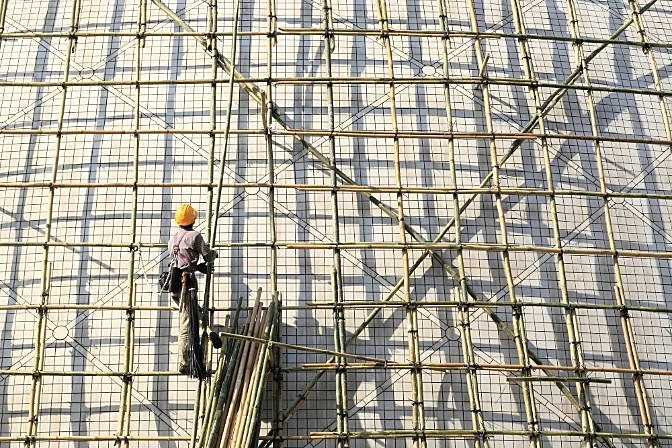Top-Notch Scaffolding Near Me: Expert Solutions for Every Job
Wiki Article
Checking Out the Different Kinds Of Scaffolding Used in Building Jobs
The building market counts greatly on numerous sorts of scaffolding to satisfy certain project requirements, each offering distinct benefits and applications. Standard framework scaffolding supplies a tough foundation for basic tasks, while suspended scaffolding is important for deal with skyscraper frameworks. Other options, such as system and rolling scaffolding, cater to efficiency and flexibility, respectively. Moreover, the cantilever alternative verifies very useful in metropolitan environments where area is constricted. Recognizing the nuances of these scaffolding kinds is important for enhancing safety and efficiency on construction websites, triggering a more detailed evaluation of their special features and applications.
Typical Structure Scaffolding
Typical framework scaffolding is among one of the most commonly used techniques in the construction market because of its toughness and adaptability. This system consists of straight and vertical frames that are assembled to develop a steady platform for products and workers. The primary components consist of upright articles, straight journals, and diagonal dental braces, which with each other give a solid framework that can sustain substantial lots.Among the crucial advantages of standard frame scaffolding is its adaptability to various construction projects, ranging from domestic structures to huge industrial frameworks. The modular style enables easy assembly and disassembly, making it effective for both lasting and short-term tasks. Additionally, the system can be customized in height and width, accommodating various structure styles and website conditions.
Security is paramount in scaffolding applications, and traditional framework systems are furnished with guardrails and toe boards to stop drops and make certain worker defense. Furthermore, routine inspections and adherence to safety and security laws are critical in preserving the honesty of the scaffold. In general, typical structure scaffolding continues to be an essential selection in the building and construction industry, offering a reliable system for labor and enhancing total project effectiveness

Suspended Scaffolding
Suspended scaffolding supplies a distinct option for building tasks that require accessibility to elevated surfaces, specifically in circumstances where traditional framework scaffolding may be unwise. This kind of scaffolding is normally put on hold from the roof covering or upper levels of a framework, utilizing a system of wheels, ropes, and systems to create a functioning area that can be gotten used to various elevations.Among the key advantages of put on hold scaffolding is its versatility. It can be quickly rearranged or lowered to fit adjustments in building and construction demands, making it ideal for tasks such as window installation, frontage work, and maintenance on skyscraper buildings. Additionally, the very little footprint of suspended scaffolding enables for much better usage of ground area in city settings, where room is often restricted.
Safety and security is an important consideration in the usage of suspended scaffolding. On the whole, suspended scaffolding supplies a efficient and effective solution for accessing hard-to-reach locations in various construction situations, enhancing both productivity and safety on website.
System Scaffolding
System scaffolding, usually considered as a contemporary solution in the scaffolding industry, contains pre-engineered components that can be quickly set up and adapted for various building and construction tasks. Scaffolding. This type of scaffolding is identified by its modular design, which allows for convenience and effectiveness on task websites, suiting structural requirements and different elevationsNormally made from high-strength steel or light weight aluminum, system scaffolding supplies improved durability and stability. The parts consist of vertical articles, horizontal journals, and diagonal braces, which adjoin firmly, ensuring a robust structure. The layout usually includes standardized installations, simplifying setting up and disassembly procedures, therefore minimizing labor time and prices.

Rolling Scaffolding
Rolling scaffolding is a flexible option to traditional fixed scaffolding, made for flexibility and simplicity of usage on building websites. This kind of scaffolding is composed of a system sustained by frameworks with wheels, permitting workers to easily relocate it as required. The mobility feature dramatically enhances efficiency, as it lessens downtime connected with putting together and taking apart fixed scaffolding.Commonly constructed from lightweight materials such as light weight aluminum or steel, Local scaffolding company rolling scaffolding uses a tough yet portable service for jobs calling for regular repositioning - Scaffolding. It is especially beneficial in jobs such as painting, drywall setup, and electric work, where accessibility to numerous heights and areas is required
Safety and security is extremely important in rolling scaffolding layout, with attributes such as securing wheels to prevent unintended motion when in use, and guardrails to safeguard employees from drops. Additionally, several designs are adjustable in elevation, suiting different task needs.
Cantilever Scaffolding

The layout of cantilever scaffolding commonly entails making use of brackets or arms anchored to a structure or framework, allowing the system to prolong external safely. Safety and security is paramount; therefore, these scaffolds need to be crafted to stand up to numerous tons and ecological conditions. Routine assessment and maintenance are necessary to guarantee architectural honesty and worker security.
Cantilever scaffolding is favored for its adaptability and efficient use of room, making it a preferred option in urban settings where room restraints prevail. Furthermore, it helps with simpler accessibility to high elevations, ultimately adding to the general efficiency of building and construction projects. Just like all scaffolding kinds, appropriate training and adherence to security criteria are vital for employees utilizing cantilever scaffolding.
Final Thought
Conventional frame scaffolding provides stability, while suspended scaffolding supplies adaptability for elevated tasks. System scaffolding helps with quick setting up, and rolling scaffolding boosts movement for differing work settings.Typical structure scaffolding provides a strong foundation for general tasks, while put on hold scaffolding is crucial for job on high-rise structures.Rolling scaffolding is a flexible option to standard set scaffolding, made for movement and convenience of usage on construction websites. As with all scaffolding kinds, proper training and adherence to safety standards are vital for workers using cantilever scaffolding.
Standard structure scaffolding provides security, while suspended scaffolding provides flexibility for elevated tasks. System scaffolding helps with quick setting up, and rolling scaffolding improves wheelchair for varying work environments.
Report this wiki page